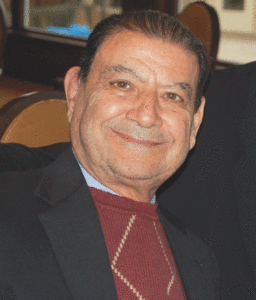by MAX SPARBER
Community News Editor
David Khabie, who died in May, had a particular trick in business. He sold and tailored high-end suits out of his house to Minnesota businessmen and celebrities (clients included baseball players Kirby Puckett and Rod Carew), and, according to son Daniel Khabie, clients would enter their house and immediately sniff the air.
“What is David’s wife cooking tonight?” they would ask.

“You’ll find out shortly,” Daniel, then a boy, would answer.
Khabie’s secret weapon was Sephardic food. Specifically, Khabie and his wife Lili came to America from Damascus, Syria, and brought the food of the region with them.
In interview with American Jewish World, Daniel Khabie recalled bringing his mother’s food with him to school as a boy and trading it with other students who had brought grilled cheese sandwiches. “I would have these little tinfoil packets, and so I would have to convince the other students that they would like what was inside it,” he said. “But once they tasted it … wow.”
“We have a sickness for food,” he added.
According to Daniel Khabie, David’s story was a particularly Jewish one. David Khabie used to work by the ports in Damascus, where he learned to speak English by interacting with the sailors. One day, a man got off a boat and David Khabie went to speak to him and see if he needed help finding anything. “I’m looking for a synagogue,” the man said.
“Oh, you’re Jewish! I’m Jewish,” Khabie answered. He took the man to his synagogue and afterwards invited him home for a meal. Afterward, the man asked Khabie to meet him at his hotel.
Once there, the man explained that he represented the American Jewish community and was in Damascus to look for Jews. “I’ve been helping the Jews of the Middle East,” he said. “We think there are going to be problems, and we can help you get to America.”
Khabie initially rejected the man’s proposal, but left with his business card. “Sure enough,” Daniel Khabie said, “a year, two years later there was the Six-Day’s War, next thing you know, they had to leave.” Syria was then run by the Ba’ath party, which was hostile to the State of Israel, and participated in the 1967 attack on Israel. At the same time, Jews in Arab countries began to experience an increase of anti-Semitism, including anti-Semitic attacks — a reported 57 Jews were killed in a pogrom in Qamishli in Northern Syria.
Khabie still had the business card and called the man he had met. “Rush to the embassy,” he was told. “We have your passport.”
The man was Sam Maslon, founder of the Maslon law firm, who himself had experienced anti-Semitism — he had founded his firm in response to the fact that Jewish lawyers found it especially hard to find employment with established non-Jewish firms in Minneapolis.
As a result of this, the Maslon law firm has long had a commitment to social justice issues, often offering pro bono services in cases that involved individual or collective rights of disadvantaged clients. Because Maslon was located in Minneapolis, this is where Daniel Khabie ended up.
Once in America, David Khabie set himself to the business of being an American Jew.
“He loved America,” Daniel Khabie said. “He loved being a part of this country.”
Daniel Khabie describes his father’s Americanness as though someone “took a blender” and blended together the hustle of his father’s Syrian background (“it’s more focused on the hustle, the streets”) and combined it with the American focus on education.
David Khabie began working in stores with tailor shops, including Justers, Dayton’s, Marshall Field’s and Macy’s, before starting his own business.
David and Lili had five children, all of whom prospered thanks to this unique combination of Syrian hustle and American education, according to Daniel Khabie. The dumbest family member, he joked, went to Harvard.
Khabie was also a member of a synagogue, Kenesseth Israel, despite it being an Ashkenazi congregation. Sephardic Jews, who originate in Spain, Portugal, North Africa and the Middle East, have unique customs, although their beliefs are largely consistent with those of European Orthodox Judaism.
Khabie soon organized a Sephardic minyan in the lower sanctuary of Kenesseth Israel, along with Abe Sclar, who immigrated from South Africa. It has continued to meet once per month for more than 30 years. Many of the attendees are not Sephardic, but come out of curiosity and also, according to Daniel Khabie, because they “just like the cuisine.”
David Khabie is survived by his wife, Lili; sons, Dr. Vico Khabie, Dr. Nissim Khabie, Daniel Khabie and Benji Khabie; and his daughter, Fifi Simon; as well as 13 grandchildren.
(American Jewish World, 6.15.18)




















